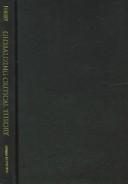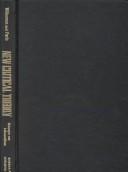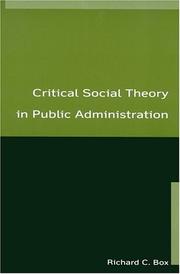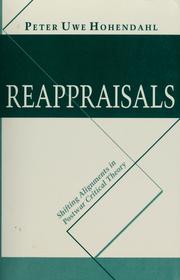| Listing 1 - 10 of 301 | << page >> |
Sort by
|
Book
Year: 2023 Publisher: Edinburgh : Edinburgh University Press,
Abstract | Keywords | Export | Availability | Bookmark
 Loading...
Loading...Choose an application
- Reference Manager
- EndNote
- RefWorks (Direct export to RefWorks)
"This book examines the heritage of critical theory from the Hungarian Marxist philosopher Georg Lukács through the early Frankfurt School up to current issues of authoritarian politics and democratisation. Interweaving discussion of art and literature, utopian thought, and the dialectics of high art and mass culture, it offers unique perspectives on an interconnected group of left-wing intellectuals who sought to understand and resist their society's systemic impoverishment of thought and experience. Starting from Lukács's reflections on art, utopia, and historical action, it progresses to the Frankfurt School philosopher Theodor W. Adorno's analyses of music, media, avant-garde and kitsch. It concludes with discussions of erotic utopia, authoritarianism, postsocialism, and organised deceit in show trials - topics in which the legacy of Lukács and Frankfurt. School critical theory continues to be relevant today"-- Provided by publisher.
Book
ISBN: 1000155889 Year: 2020 Publisher: Routledge
Abstract | Keywords | Export | Availability | Bookmark
 Loading...
Loading...Choose an application
- Reference Manager
- EndNote
- RefWorks (Direct export to RefWorks)
The term 'Frankfurt School' is used widely, but sometimes loosely, to describe both a group of intellectuals and a specific social theory. Focusing on the formative and most radical years of the Frankfurt School, during the 1930s, this study concentrates on the Frankfurt School's most original contributions made to the work on a 'critical theory of society' by the philosophers Max Horkheimer and Herbert Marcuse, the psychologist Erich Fromm, and the aesthetician Theodor W. Adorno.Phil Slater traces the extent, and ultimate limits, of the Frankfurt School's professed relation to the Marxian critique of political economy. In considering the extent of the relation to revolutionary praxis, he discusses the socio-economic and political history of Weimar Germany in its descent into fascism, and considers the work of such people as Karl Korsch, Wilhelm Reich, Walter Benjamin and Bertolt Brecht, which directs a great deal of critical light on the Frankfurt School.While pinpointing the ultimate limitations of the Frankfurt School's frame of reference, Phil Slater also looks at the role their work played (largely against their wishes) in the emergence of the student anti-authoritarian movement in the 1960s. He shows that, in particular, the analysis of psychic and cultural manipulation was central to the young rebels' theoretical armour, but that even here, the lack of economic class analysis seriously restricts the critical edge of the Frankfurt School's theory. His conclusion is that the only way forward is to rescue the most radical roots of the Frankfurt School's work, and to recast these in the context of a practical theory of economic and political emancipation.
Book
Year: 1993 Publisher: [Place of publication not identified] : Éditions de la Sorbonne,
Abstract | Keywords | Export | Availability | Bookmark
 Loading...
Loading...Choose an application
- Reference Manager
- EndNote
- RefWorks (Direct export to RefWorks)
Dans ce climat général d'anesthésie contemporaine, dans la course à l'informatisation et à la recrudescence du religieux cachant mal des modes de pensée autoritaires, dans le cynisme ambiant du nouvel ordre international et du réveil brutal des nationalismes, en ces temps niais où le brouillage des repères incite les nantis à proclamer la venue du "dernier homme" (Fukuyama), en cette période où la philosophie (certaines philosophies occidentales ! ) semble démissionner dans sa lutte contre ...

ISBN: 1461607108 129913601X 9781461607106 0742534499 9780742534490 0742534502 9780742534506 Year: 2005 Publisher: Lanham, Md. Rowman & Littlefield
Abstract | Keywords | Export | Availability | Bookmark
 Loading...
Loading...Choose an application
- Reference Manager
- EndNote
- RefWorks (Direct export to RefWorks)
Across a spectrum of academic disciplines, the topic of globalization is at the forefront of contemporary efforts to understand a dynamically changing world society. How might critical social theory respond creatively to the challenge of thinking and theorizing globalization in its full complexity?
Critical theory. --- Frankfurt school of sociology. --- Globalization.

ISBN: 1461610389 1299136117 9781461610380 9781299136113 0742512770 9780742512771 0742512789 9780742512788 Year: 2001 Publisher: Lanham [Md.] Rowman & Littlefield Publishers
Abstract | Keywords | Export | Availability | Bookmark
 Loading...
Loading...Choose an application
- Reference Manager
- EndNote
- RefWorks (Direct export to RefWorks)
An edited collection of all new work in the area of 'new critical theory,' intended to serve as a signature volume for the New Critical Theory Series. The volume, like the series as a whole, is designed to capture the present moment in postdisciplinary theory, as the older tradition of critical theory in the Frankfurt School sense comes together with postmodernism and the new critical theory. It represents the dialogue that is taking place among the various strands of theory and can serve as a survey of contemporary leftist philosophy.
Dissertation
ISBN: 1859722741 Year: 1996 Publisher: Aldershot Avebury
Abstract | Keywords | Export | Availability | Bookmark
 Loading...
Loading...Choose an application
- Reference Manager
- EndNote
- RefWorks (Direct export to RefWorks)
Critical theory --- Frankfurt school of sociology --- Philosophy, Modern --- Philosophy, Modern
Book
ISBN: 0674973534 0674973518 Year: 2017 Publisher: Cambridge, MA : Harvard University Press,
Abstract | Keywords | Export | Availability | Bookmark
 Loading...
Loading...Choose an application
- Reference Manager
- EndNote
- RefWorks (Direct export to RefWorks)
From the beginning to the end of his career, the critical theorist Theodor W. Adorno sustained an uneasy but enduring bond with existentialism. His attitude overall was that of unsparing criticism, verging on polemic. In Kierkegaard he saw an early paragon for the late flowering of bourgeois solipsism; in Heidegger, an impresario for a “jargon of authenticity” cloaking its idealism in an aura of pseudo-concreteness and neo-romantic kitsch. Even in the straitened rationalism of Husserl’s phenomenology Adorno saw a vain attempt to break free from the prison-house of consciousness. Most scholars of critical theory still regard these philosophical exercises as marginal works—unfortunate lapses of judgment for a thinker otherwise celebrated for dialectical mastery. Yet his persistent fascination with the philosophical canons of existentialism and phenomenology suggests a connection far more productive than mere antipathy. From his first published book on Kierkegaard’s aesthetic to the mature studies in negative dialectics, Adorno was forever returning to the philosophies of bourgeois interiority, seeking the paradoxical relation between their manifest failure and their hidden promise. Ultimately, Adorno saw in them an instructive if unsuccessful attempt to realize his own ambition: to escape the enchanted circle of idealism so as to grasp “the primacy of the object.” Exercises in “immanent critique,” Adorno’s writings on Kierkegaard, Husserl, and Heidegger present us with a photographic negative—a philosophical portrait of the author himself. In Adorno and Existence, Peter E. Gordon casts new and unfamiliar light on this neglected chapter in the history of Continental philosophy.
Existentialism. --- Frankfurt school of sociology. --- Adorno, Theodor W., --- Kierkegaard, Søren,

ISBN: 1317473566 076561555X 1317473574 1315705346 9781317473572 0765615541 9780765615541 Year: 2005 Publisher: Armonk, N.Y. M.E. Sharpe
Abstract | Keywords | Export | Availability | Bookmark
 Loading...
Loading...Choose an application
- Reference Manager
- EndNote
- RefWorks (Direct export to RefWorks)
The essential premise of critical social theory is that contemporary society is neither democratic nor free, but that modern global capitalism creates a citizenry satiated with consumer goods, unaware of alternative ways of living. In the public sector, critical theory suggests that governing systems are influenced, if not controlled, by the wealthy and powerful, leaving public professionals to decide whether to serve those interests or the interests of a broader public. This book provides a framework for the application of critical social theory in public administration. Its goal is to encour
Public administration --- Critical theory. --- Frankfurt school of sociology. --- Philosophy.
Book
ISBN: 128311979X 9786613119797 9004194681 9789004194687 9789004188006 Year: 2011 Publisher: Leiden [The Netherlands] Boston Brill
Abstract | Keywords | Export | Availability | Bookmark
 Loading...
Loading...Choose an application
- Reference Manager
- EndNote
- RefWorks (Direct export to RefWorks)
This book provides a thematic account of the changing political philosophy of critical theorists from Adorno to Habermas and Honneth. In addition to teasing out unexplored elements of political thought from the writings of important Frankfurt School intellectuals and their successors, the book seeks to establish the relevance of this tradition for contemporary political theory. Readers are offered an inside perspective, developed out of primary texts including some hitherto unused sources, which is combined with the outside perspective of non-Frankfurt School traditions such as cultural sociology. Heins presents a fresh reading of Critical Theory in ways that remind us both of what this theory is and what it can be.
Critical theory --- Frankfurt school of sociology. --- Sociology --- Political aspects.

ISBN: 080149706X 9780801497063 1501705458 9781501705458 0801424550 9780801424557 150170544X Year: 1991 Publisher: Ithaca, NY : Cornell University Press,
Abstract | Keywords | Export | Availability | Bookmark
 Loading...
Loading...Choose an application
- Reference Manager
- EndNote
- RefWorks (Direct export to RefWorks)
Reappraisals is a provocative account of the development of modern critical theory in Germany and the United States. Focusing on the period since World War II, Peter Uwe Hohendahl explores key debates on the function of critical theory, illuminating the diverse positions and alliances among the participants. Bringing together six essays, as well as new introductory and concluding chapters, Hohendahl interprets and subjects to critical scrutiny many of the central ideas of the Frankfurt School. He first maps the trajectory of neomarxist criticism in Germany to the 1980s. Individual chapters then focus on the work of Georg Lukacs, Theodor W. Adorno, and Jürgen Habermas, and on such issues as the politicization of German criticism after 1965 under the influence of the Frankfurt School.
| Listing 1 - 10 of 301 | << page >> |
Sort by
|

 Search
Search Feedback
Feedback About UniCat
About UniCat  Help
Help News
News